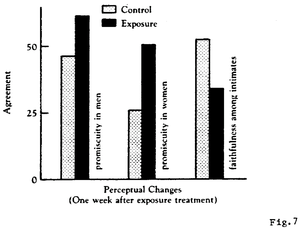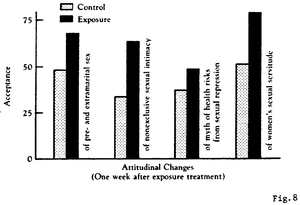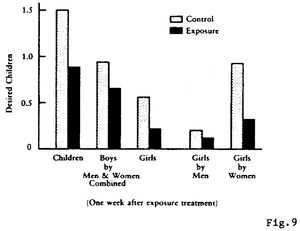Opposition to pornography

Reasons for opposition to pornography include religious objections, feminist concerns, and claims of harmful effects, such as pornography addiction. Anti-pornography movements have allied disparate social activists in opposition to pornography, from social conservatives to harm reduction advocates. The definition of "pornography" varies between countries and movements, and many make distinctions between pornography, which they oppose, and erotica, which they consider acceptable. Sometimes opposition will deem certain forms of pornography more or less harmful, while others draw no such distinctions.
A 2013 Gallup survey reported that, of U.S. adults, 66% believe that pornography is "morally wrong" while 31% believe that it is "morally acceptable".[1] The gender gap in pornography opposition has widened in the recent decades; women remain more opposed to pornography than men, while men's opposition has declined faster.[2]
Religious views
Most world religions have positions in opposition to pornography from a variety of rationales,[3][4][5][6] including concerns about modesty, human dignity, chastity and other virtues.
Feminist views
Some feminists are opposed to pornography, arguing that it is an industry which exploits women and is complicit in violence against women, both in its production (where they charge that abuse and exploitation of women performing in pornography is rampant) and in its consumption (where they charge that pornography eroticizes the domination, humiliation, and coercion of women, and reinforces sexual and cultural attitudes that are complicit in rape and sexual harassment).[7] They charge that pornography contributes to the male-centered objectification of women and thus to sexism.[8]
However, many other feminists are opposed to censorship, and have argued against the introduction of anti-porn legislation in the United States - among them Betty Friedan, Kate Millett, Karen DeCrow, Wendy Kaminer and Jamaica Kincaid.[9] Some sex-positive feminists actively support pornography that depicts female sexuality in a positive way, without objectifying or demeaning women.
Conservative views
Religious conservatives commonly oppose pornography, along with a subset of feminists, though their reasoning may differ.[2] Many religious conservatives view pornography as a threat to children. Some conservative Protestants argue that because it encourages non-procreative sex, encourages abortion, and can be connected to the rise of sexually transmitted diseases.[10]
Concerned Women For America (CWA) is a conservative organization that opposes same-sex marriage and abortion. When discussing violence against women, the CWA often uses pornography to illustrate their points. The CWA asserts that pornography is a major reason why men inflict harm on women.[11] The CWA argues that pornography convinces men to disrespect their wives and neglect their marriages, thereby threatening the sanctity of traditional marriage. Unlike other issues CWA has tackled, they are less forcefully anti-feminist when it comes to the topic of pornography, as many of their points surrounding why pornography is distasteful parallels those of anti-pornography feminists.[11]
Harm-based views



Dolf Zillmann argued in the 1986 publication "Effects of Prolonged Consumption of Pornography" that extensive viewing of pornographic material produces many unfavorable sociological effects, including a decreased respect for long-term monogamous relationships, and an attenuated desire for procreation.[12] He describes the theoretical basis of these experimental findings:
The values expressed in pornography clash so obviously with the family concept, and they potentially undermine the traditional values that favor marriage, family, and children... Pornographic scripts dwell on sexual engagements of parties who have just met, who are in no way attached or committed to each other, and who will part shortly, never to meet again... Sexual gratification in pornography is not a function of emotional attachment, of kindness, of caring, and especially not of continuance of the relationship, as such continuance would translate into responsibilities, curtailments, and costs...[13]
A study by Zillman in 1982 also indicated that prolonged exposure to pornography desensitized both men and women toward victims of sexual violence. After being shown pornographic movies, test subjects were asked to judge an appropriate punishment for a rapist. The test subjects recommended incarceration terms that were significantly more lenient than those recommended by control subjects who had not watched pornography.[12]
Some researchers like Zillman believe that pornography causes unequivocal harm to society by increasing rates of sexual assault,[12] a line of research which was critiqued in "The Effects of Pornography: An International Perspective".[14] Other researchers believe that there is a correlation between pornography and a decrease of sex crimes.[15][16][17]
Pornography is often criticized for presenting an inaccurate picture of human sexuality.
The appropriation of the sexually explicit in American culture is part of what has been called "the pornification of America".[18][19]
Rape culture is often discussed when it comes to pornography, and is defined by society victim-blaming women because of their rape. It is known as society making rape less substantial. Some of the most searched titles on pornography websites is rape scenes.[20]
Criticism
Pornophobia, from Greek roots pornē, "whore" and phobia, literally means fear of prostitutes. It may also refer to fear of sexual expression, in particular, fear of pornography.[21]
Nadine Strossen, former president of the American Civil Liberties Union, uses the coinages "pornophobia" and "pornophobes" when referring to attitudes of pro-censorship and conservatives to the imagery of nudity, which they often refer to as "pornography".[22][23] Incidents have occurred at several colleges such as the University of Arizona and the University of Michigan Law School where feminist students have physically attacked exhibits of photographic self-portraits claiming that they must be taken down because these exhibits had sexual themes.[22]
See also
- Anti-pornography movement in the United Kingdom
- Anti-pornography movement in the United States
- Pornophobia
- Pornography addiction
- Pornography by region
- Religious views on pornography
- Right to pornography
- Women Against Pornography
- Women Against Violence in Pornography and Media
- Criticism of Wikipedia#Sexual content
Further reading
Anti-pornography advocacy
- Fight the New Drug, secular, non-profit organization, largest anti-porn organization based in the US [24]
- Susan Brownmiller (1999). In Our Time: Memoir of a Revolution. The Dial Press. ISBN 0-385-31486-8.
- Patrick Carnes
- Victor Cline
- Nikki Craft, long-time political, anti-pornography activist and prolific writer on feminist subjects
- Andrea Dworkin (1979). Pornography: Men Possessing Women. ISBN 0-452-26793-5.
- Susan Griffin. Pornography and Silence: Culture's Revenge Against Nature. New York: Harper, 1981.
- Craig Gross, founder of XXXchurch.com, a non-profit Christian organization that educates on the dangers of pornography use and involvement
- Robert Jensen (2007). Getting Off: Pornography and the End of Masculinity. Cambridge, MA: South End Press. ISBN 978-0-89608-776-7.
- Gail Dines/Robert Jensen/Ann Russo (1998). Pornography: The Production and Consumption of Inequality. Routledge. ISBN 0-415-91813-8.
- Susanne Kapeller (1986). The Pornography of Representation. Polity Press, Cambridge, UK ISBN 0-7456-0122-7.
- Michael Kimmel (1991). Men Confront Pornography. New York: Meridian — Random House. ISBN 0-452-01077-2. (a variety of essays that try to assess ways that pornography may take influence or harm men)
- Shelley Lubben, former porn performer and self-described "porn missionary"[25] who counsels active porn performers on how to escape the industry[26] (2010). Truth Behind the Fantasy of Porn: The Greatest Illusion on Earth. CreateSpace. ISBN 978-1-4538-6007-6.
- Catharine MacKinnon (1985). Pornography, Civil Rights, and Speech. 20 Harv. C.R.-C.L. L. Rev. 1 (arguing that pornography is one of the mechanisms of power used to maintain gender inequality)
- Donny Pauling, former pornographic producer who currently speaks about the unseen side of porn that is damaging to the women involved; frequently worked with Craig Gross of XXXChurch, until pleading to a six-year underage sex sentencing
- Christine Stark and Rebecca Whisnant (2004). Not for sale: feminists resisting prostitution and pornography. North Melbourne, Victoria: Spinifex Press. ISBN 9781876756499.
Criticism of anti-pornography
- Susie Bright. "Susie Sexpert's Lesbian Sex World and Susie Bright's Sexual Reality: A Virtual Sex World Reader", San Francisco, CA: Cleis Press, 1990 and 1992. Challenges any easy equation between feminism and anti-pornography positions.
- Betty Dodson. "Feminism and Free speech: Pornography." Feminists for Free Expression 1993. 8 May 2002.
- Kate Ellis. Caught Looking: Feminism, Pornography, and Censorship. New York: Caught Looking Incorporated, 1986.
- Matthew Gever. "Pornography Helps Women, Society", UCLA Bruin, 1998-12-03.
- Michele Gregory. "Pro-Sex Feminism: Redefining Pornography (or, a study in alliteration: the pro pornography position paper) "[27]
- Gayle Rubin, "Dangerous, Misguided, and Wrong: An Analysis of Anti-Pornograph Politics." In "Bad Girl and Dirty Pictures," ed. Carol Assuster (1993).
- Andrea Juno and V. Vale. Angry Women, Re/Search # 12. San Francisco, CA: Re/Search Publications, 1991. Performance artists and literary theorists who challenge Dworkin and MacKinnon's claim to speak on behalf of all women.
- Ley, David, Prause, Nicole, & Finn, Peter. (2014). The Emperor Has No Clothes: A review of the “Pornography Addiction” model. Current Sexual Health Reports, manuscript in press.[30]
- Annalee Newitz. "Obscene Feminists: Why Women Are Leading the Battle Against Censorship." San Francisco Bay Guardian Online 8 May 2002. 9 May 2002[31]
- Nadine Strossen:
- Scott Tucker. "Gender, Fucking, and Utopia: An Essay in Response to John Stoltenberg's Refusing to Be a Man."[33] in Social Text 27 (1991): 3-34. Critique of Stoltenberg and Dworkin's positions on pornography and power.
- Carole Vance, Editor. "Pleasure and Danger: Exploring Female Sexuality". Boston: Routledge, 1984. Collection of papers from 1982 conference; visible and divisive split between anti-pornography activists and lesbian S&M theorists.
Notes
- ↑ Newport, Frank; Igor Himelfarb (May 20, 2013). "In U.S., Record-High Say Gay, Lesbian Relations Morally OK". Gallup.
- 1 2 Lykke, Lucia; Cohen, Philip (2015). "The Widening Gender Gap in Opposition to Pornography, 1975–2012". Social Currents. 2 (4): 307–323. doi:10.1177/2329496515604170.
- ↑ Slick, Matt. "What does the Bible say about pornography? Is it wrong?". Retrieved 6 May 2013.
- ↑ Freeman, Tzvi. "What's Wrong With Pornography?". Retrieved 6 May 2013.
- ↑ Mujahid, Abdul Malik. "Islam on Pornography: A Definite No-No". Retrieved 6 May 2013.
- ↑ Smith, Neil. "The Science Behind Negative Effects of Masturbation (and Pornography)". Retrieved 8 November 2014.
- ↑ Morgan, Robin (1974). "Theory and Practice: Pornography and Rape". In: Going Too Far: The Personal Chronicle of a Feminist. Random House. ISBN 0-394-48227-1.
- ↑ MacKinnon, Catharine (1987). Feminism Unmodified: Discourses on Life and Law. Cambridge, MA: Harvard University Press. pp. 146–150.
- ↑ http://www.fiawol.demon.co.uk/FAC/harm.htm
- ↑ Sherkat, Darren; Ellison, Christopher (1997). "The Cognitive Structure of a Moral Crusade: Conservative Protestantism and Opposition to Pornography". Social Forces. 75: 957–980. JSTOR 2580526.
- 1 2 Schreiber, Ronnee (2008). Righting Feminism. New York: Oxford University Press.
- 1 2 3 4 Report of the Surgeon General's Workshop on Pornography and Public Health: Background Papers: 'Effects of Prolonged Consumption of Pornography' (August 4, 1986)
- ↑ Zillmann, pages 16-17
- ↑ The effects of Pornography: An International Perspective
- ↑ "Pornography, rape and the internet" (PDF). Archived (PDF) from the original on 2 November 2006. Retrieved 2006-10-25.
- ↑ D'Amato, Anthony (2006-06-23). "Porn Up, Rape Down". SSRN 913013
 .
. - ↑ The Effects of Pornography: An International Perspective Archived 2012-02-03 at the Wayback Machine. University of Hawaii Porn 101: Eroticism, Pornography, and the First Amendment: Milton Diamond Ph.D.
- ↑ John W. Whitehead, "Miley Cyrus and the Pornification of America", The Rutherford Institute, https://www.rutherford.org/publications_resources/john_whiteheads_commentary/miley_cyrus_and_the_pornification_of_america, retrieved 2014-09-07
- ↑ Don Aucoin, "The pornification of America. From music to fashion to celebrity culture, mainstream entertainment reflects an X-rated attitude like never before" Boston Globe, January 24, 2006, http://www.boston.com/yourlife/articles/2006/01/24/the_pornification_of_america/?page=full, retrieved 2014-09-07
- ↑ Makin, David (2015). "The Dark Side of Internet Searches: A Macro Level Assessment of Rape Culture". Open Access. 9: 1–23 – via Coastal Carolina University.
- ↑ Rodney Sappington, Tyler Stallings, Uncontrollable Bodies: Testimonies of Identity and Culture, Bay Press, 1994, ISBN 0941920275, footnote 1 at p. 261
- 1 2 Nadine Strossen, The perils of pornophobia The Humanist, an essay adapted from author's book, Defending Pornography: Free Speech, Sex, and the Fight for Women's Rights (Scribner, January 1995).
- ↑ Against Pornophobia, New York Magazine, 16 January 1995
- ↑ http://www.fightthenewdrug.org/get-the-facts
- ↑ About Shelley Former Porn Actress Shelley Lubben
- ↑ "Out of Pornography and Into the Light". CBN. Retrieved 2010-04-18.
- ↑ http://witsendzine.com/musings/michele/ppp.htm
- ↑ WendyMcElroy.com: Content / Individualist Feminism - Theory / A Feminist Overview of Pornography
- ↑ A Feminist Defense of Pornography Archived 1998-12-01 at the Wayback Machine.
- ↑ Ley, David; Prause, Nicole; Finn, Peter (2014). "The Emperor Has No Clothes: A Review of the 'Pornography Addiction' Model". Current Sexual Health Reports. 6 (2): 94–105. doi:10.1007/s11930-014-0016-8.
- ↑ sfbg.com
- ↑ Nadine Strossen (November 1995). "Pornography Must Be Tolerated". The Ethical Spectacle.
- ↑ The Columbia reader on lesbians and ... - Google Books